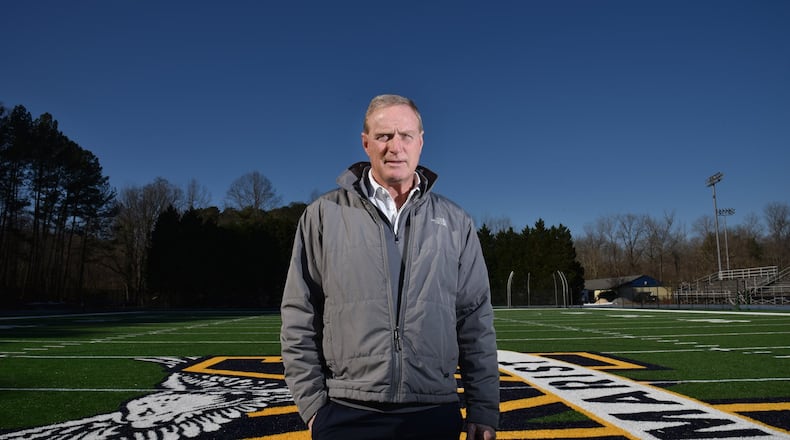When longtime Marist coaching legend Alan Chadwick earned his 400th career victory Aug. 27, he became the nation’s 35th high school coach to achieve that feat and just the second in Peach State history.
Yet, if you talked to him after the game, you wouldn’t know the win was historical. Win or lose, in fact, his postgame demeanor has been described as somewhere between laid back and even keel.
It hasn’t always been that way for Chadwick, who turns 70 in October, but he’s older now.
“When you’ve been doing this for 46 years, you know it can go one or two ways,” said Chadwick, now in his 37th season. “You’ve been there so many times, and it’s gone either way. That’s just part of it. It doesn’t mean I’m not less intense on the inside. Or that I don’t get teed off, disappointed, heartbroken, happy, elated, or whatever. You have to learn how to process wins and losses, otherwise it chews you up too much.”
The early-season milestone win came after Marist won its third state title in program history, defeating Jefferson in the the Class 4A championship game in December.
Chadwick, who has been head coach for all the state titles (1989, 2003, 2020), took over the program in 1985 after serving as an assistant under Dean Hargis, who coached Marist from 1968-84. This following a playing career at quarterback as a Decatur graduate who went on to play for Georgia and East Tennessee State. He was drafted by the Chicago Bears in 1974.
At Marist, he has been a model of consistency. His War Eagles have never had a losing season and are winners of 19 region titles.
Although Chadwick built Marist’s identity around his signature triple-option offense, he acknowledges it took more than his football mind to reach this point. He has evolved as a leader, relinquishing some duties to his entrusted staff of longtime assistants, and adapting to changes the sport has experienced through the years.
“I was more intense when I was younger, more fiery,” Chadwick said. “I was also the play-caller for a number of years as a coordinator and a coach. But it just becomes too much after so many years of doing that. We’ve got great coaches on both sides of ball who know each other, know what to expect and can agree on things. I’ve become a little more of a game manager, and I find myself thinking more about situations, tempo of game, game management and the flow of the game. I’m thinking ahead a little more.”
While some assistant coaches have come and gone, a handful have stayed on staff for more than a decade, and Chadwick credits them with helping him win. Offensive coordinator Paul Etheridge met Chadwick as a seventh-grade student at Marist, played for the War Eagles in the late-1980s and first joined Chadwick’s staff in 1993.
Etheridge and other longtime assistants Jef Euart (defensive coordinator), Dan Perez (defensive line coach), James Showfety (running backs) and Danny Stephens (defensive ends), among others, have formed a strong bond with each other and Chadwick.
“I wouldn’t do it if these guys weren’t my best friends,” Etheridge said. “I’ve known Dan since I was 12, and we were starters together. Gary Miller (another longtime assistant) taught me chemistry. Imagine competing every day with 6-7 of your best friends. It’s a fantastic experience, and it’s what keeps everyone coming back. Coach Chadwick would be the first to tell you — and I’ve heard this from other coaches, too — is what an incredible asset it is to have staff continuity and a core that doesn’t change. From a stability standpoint, it’s amazing he’s kept this staff intact for so long.”
Chadwick has allowed his staff to work to their strengths, which has led to the War Eagles expanding from the base offense he designed. It also has allowed him to focus his energy on the macro-management of the team.
“This is his baby, and he used to call plays for the longest time,” Etheridge said. “He hasn’t called a play in 20 years, but he’s giving input, and he has great eye for seeing things. He’ll say, ‘Hey, come back to this,’ or ‘Do this.’ Or ‘Look at this.’ In the 20 years I’ve coached for him, I can count the times on one hand that he said, ‘I want to run this play right now,’ so that lets you know he trusts his assistants.”
Chadwick said he modified his triple-option because Marist was losing potential players who didn’t want to play in a limited offense, and he wanted his defenses to prepare for spread-offense plays during practice.
Chadwick has coached generations of War Eagles. Senior running back Andrew Mannelly is the latest from his family to suit up for Marist, joining his two older brothers, father and uncle.
“I remember he came up to me when I was practicing in seventh grade,” Mannelly said. “He was the kind of leader we knew we wanted to play for, and we knew we’d have to work hard from that point on to get to play for him.”
Some things remain the same. Chadwick has been described by many around the program, including himself, as “grumpy” at times. But perhaps his most distinguishable personality trait, and one that’s largely accountable for his success, is his intense focus on winning.
“That’s what’s earned him the respect of players and coaches,” senior running back Quinn Gooding said. “When you think of focus, maybe you think angry yelling most of time, but he’s actually kind of quiet. He only turns on the angry mode when he has to, but if we’re playing well, playing consistently, then he’s not overly happy, not too excited. He keeps that mentality because he expects to win.”
Chadwick said he thinks he’ll coach 2-3 more years, if health allows.
“Right now, I’m enjoying it, and I still feel like I’ve something to contribute,” he said.
About the Author

